
Resilient Solidarities: Feminist Experiences on Trust-and Community-building
(Vol. 9, No. 1, Winter 2023)
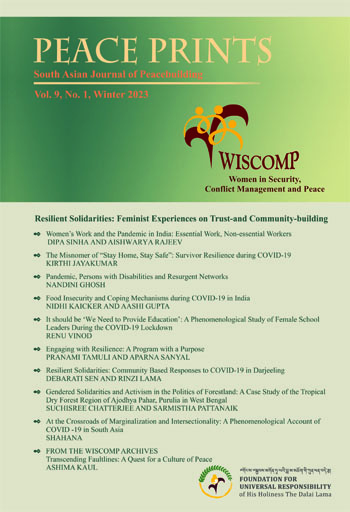
| » |
Editorial
Rukmini Sen Read More... |
| » |
Women’s Work and the Pandemic in India: Essential Work, Non-essential Workers
Dipa Sinha and Aishwarya Rajeev Read More... |
| » |
The Misnomer of “Stay Home, Stay Safe:” Survivor Resilience during COVID-19
Kirthi Jayakumar Read More... |
| » |
Pandemic, Persons with Disabilities and Resurgent Networks
Nandini Ghosh Read More... |
| » |
Food Insecurity and Coping Mechanisms during Covid-19 in India
Nidhi Kaicker and Aashi Gupta Read More... |
| » |
We Need to Provide Education: A Phenomenological Study of Female School Leaders During the COVID-19 Lockdown
Renu Vinod Read More... |
| » |
Engaging with Resilience: A Program with a Purpose
Pranami Tamuli and Aparna Sanyal Read More... |
| » |
Resilient Solidarities: Community Based Responses to Covid-19 in Darjeeling
Debarati Sen and Rinzi Lama Read More... |
| » |
Gendered Solidarities and Activism in the Politics of Forestland: A Case Study of the Tropical Dry Forest Region of Ajodhya Pahar, Purulia in West Bengal
Suchisree Chatterjee and Sarmistha Pattanaik Read More... |
| » |
Transcending Faultlines: A Quest for a Culture of Peace
Ashima Kaul Read More... |
| » |
At the Crossroads of Marginalization and Intersectionality: A Phenomenological Account of COVID-19 in South Asia
Shahana Read More... |
Rukmini Sen is Professor, School of Liberal Studies, and currently Dean School of Heritage Research and Management at Dr. B. R. Ambedkar University Delhi. She is a feminist legal sociologist, and specializes in sociology of law, feminist pedagogy and jurisprudence, women's movements, memoirs and personal narratives, kinship and intimacies, cities and cultures. She has co-edited two books: Trust in Transactions (2019) and Doing Feminisms in the Academy: Identity, Institutional Pedagogy and Critical Classrooms in India and the UK (2020). She has co-edited special issues in journals ‘Power and Relationships in the Academia: Feminist Dilemmas beyond the List-Statement Binary’ for Economic and Political Weekly Engage (2017) and ‘Indian Feminisms, Law Reform and Law Commission of India: Special issue in Honour of Lotika Sarkar’, Journal of Indian Law and Society (2015). She is Executive Committee Member (Asia Representative) RC 32 Women, Gender and Society, International Sociological Association.
For further details: https://aud.ac.in/faculty/prof-rukmini-sen
Contact Us
Archives
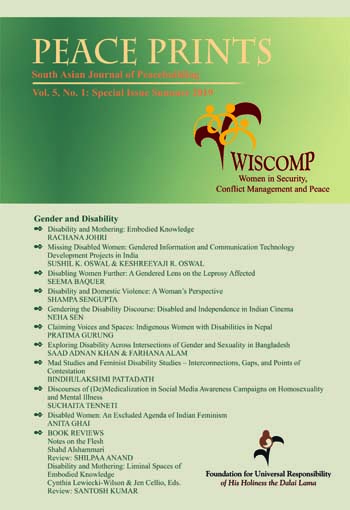 |
 |
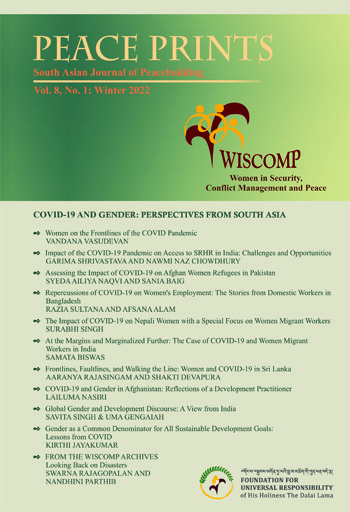
|
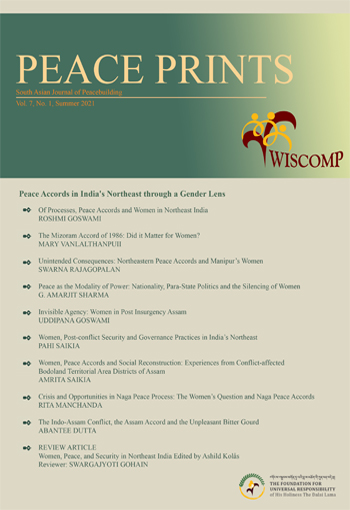
|
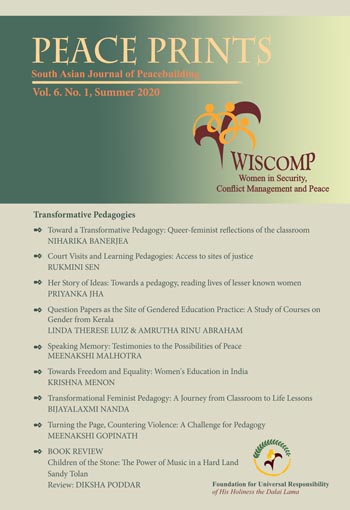 |
|
Being "(Re) Armed": Women and the Security Sector
Volume 10, No. 1, 2024 |
Resilient Solidarities: Feminist Experiences on Trust-and Community-building Volume 9, No. 1, 2023 |
COVID-19 and Gender: Perspectives From South Asia Volume 8, No. 1, 2022 |
Peace Accords in India's Northeast through a Gender Lens Volume 7, No. 1, 2021 |
Transformative Pedagogies Volume 6, No. 1, 2020 |
 |
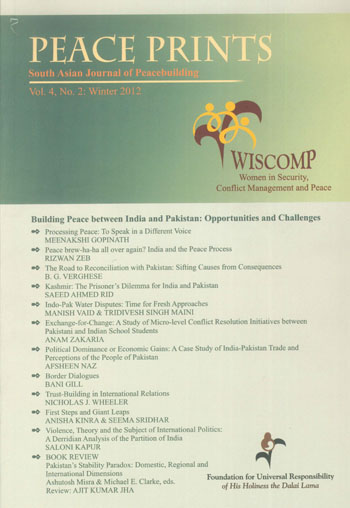 |
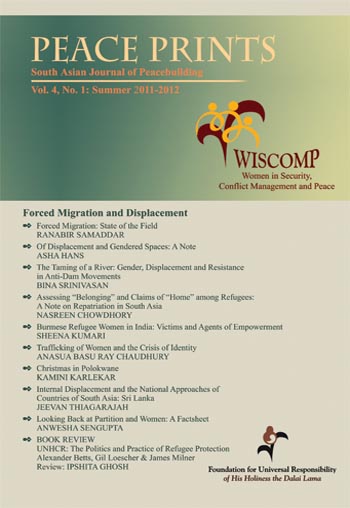 |
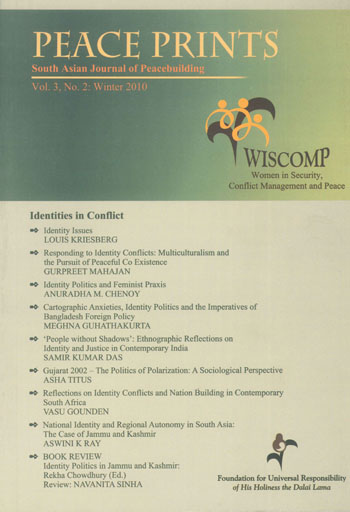 |
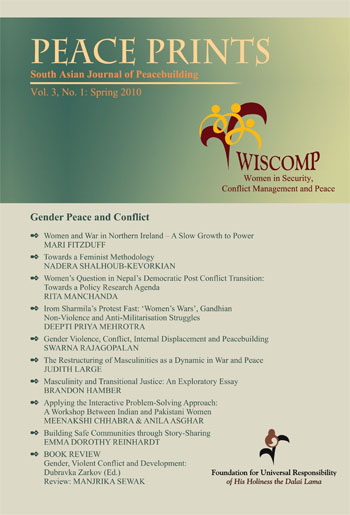 |
|
Gender and Disability
Vol. 5, No. 1, 2019 |
Building Peace between India and Pakistan
Vol 4, No 2, 2012 |
Force Migration and Displacement Vol 4, No 1, 2011-12 |
Identities in Conflict
Vol 3, No 2, 2010 Special Edition |
Gender Peace and Conflict
Vol 3, No 1, 2010 |
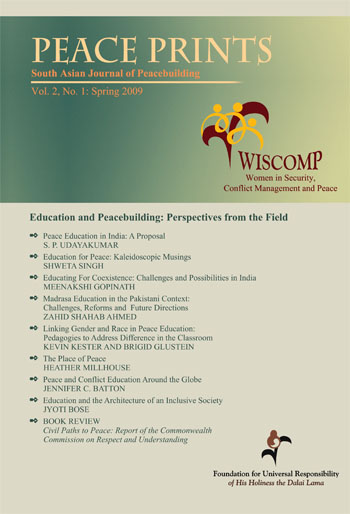 |
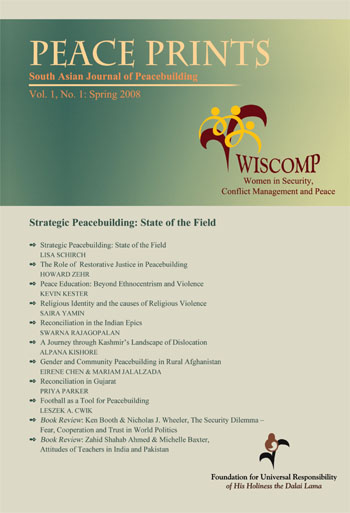 |
|||
| Education and Peacebuilding Vol 2, No 1, 2009 |
Strategic Peacebuilding: State of the Field
Vol 1, No 1, 2008 |
Returning with a Renewed Mission!
Peace Prints is back after a hiatus of six years with a renewed mission to enhance its footprint not just in South Asia but beyond. In keeping with the expansion in the domain of Peacebuilding, Peace Prints has expanded its scope to include the emerging frontiers of scholarship and research. The organizational and funding constraints have been overcome. In this new phase of reorganization, we infuse this pioneering effort with the energy that comes with expanding circles of engagement and linkages to wider networks of both experienced and younger researchers.About WISCOMP
WISCOMP, an initiative of the Foundation for Universal Responsibility has been a pioneer in initiating the discourse on women, peace, and security in South Asia. It was at the forefront of engaging with these issues, well before they found articulation in the UN Security Council Resolution 1325 in October 2000. Its efforts have yielded a robust network across borders and boundaries that highlight the leadership of women in the areas of peace and security—a space that was hitherto not fully encouraging of the participation of women.WISCOMP is an initiative of the Foundation for Universal Responsibility, which was established with funds from the Nobel Peace Prize awarded to His Holiness The Dalai Lama in 1989.
For more information, visit www.wiscomp.org
